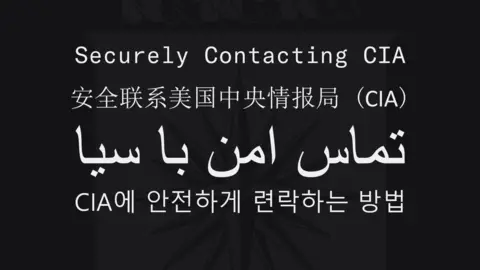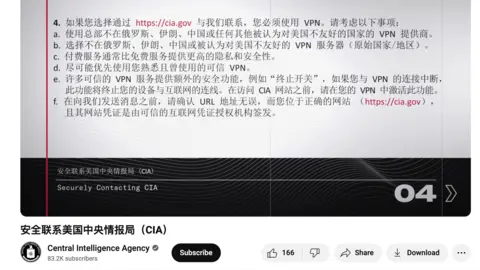CIA seeks informants in North Korea, Iran and China
 CIA/Facebook
CIA/FacebookThe US Central Intelligence Agency has launched a new drive to recruit informants in China, Iran and North Korea.
The organisation posted messages on its social media accounts in Mandarin, Farsi and Korean on Wednesday, instructing users how to contact it securely.
This latest effort follows a campaign to enlist Russians in the wake of the invasion of Ukraine, which the CIA says was a success.
"We want to make sure individuals in other authoritarian regimes know that we're open for business," a CIA spokesman said in a statement.
The recruitment messages - which were placed on platforms such as X, Facebook, YouTube, Instagram, Telegram and LinkedIn, as well as on the dark web - asked for individuals' names, locations and contact details.
Detailed instructions advised users to contact the CIA via its official website using trusted encrypted Virtual Private Networks (VPNs) or an anonymous web browser known as the Tor network, which is often used to access the dark web.
"I can't remember any sort of recruitment effort like this, using YouTube or social media in this way, at least in Korean," said Mason Richey, associate professor of international politics at Hankuk University of Foreign Studies in Seoul.
"It seems like they're basing this off the success they had in Russia - but I would question how effective this will be considering most North Koreans don't have access to the internet," he told the BBC.
Professor Richey suggested that the United States may be targeting North Korean traders who informally cross the border with China and might be able to access VPN networks.
US intelligence considers North Korea, Iran and China "hard targets" when it comes to intelligence gathering, given the harsh level of surveillance all countries employ to stamp out dissent.
"This effort represents just one way in which CIA is adapting to a new global environment of increased state repression and global surveillance," the spy agency's statement continued.
But Professor Richey questioned the value of any intelligence that the campaign might be able to gather.
"I suppose you have to assume the CIA knows what it's doing, but you do wonder how many of these discontented people are close enough to power and close enough to the places where important decisions are made," he said.
"It does, at the very least though, throw some sand in the gears of these counter-intelligence operations," he added.
 CIA/YouTube
CIA/YouTubeAmerican intelligence chiefs, encouraged by efforts in Russia, are nonetheless confident they will reach enough dissatisfied citizens who are willing to contact them with potentially useful information.
"There are plenty of people who have access to information and who are disaffected from the Xi regime in China," CIA Deputy Director David Cohen told Bloomberg.
"You’ve got people inside who... for lots of different motivations fundamentally do not like the direction that Xi is taking the country and understand that there’s a path to helping their own country by working with us," he added.
Liu Pengyu, a Chinese embassy spokesman, said the US was waging "an organised and systematic" disinformation campaign against China.
"Any attempts to drive a wedge between the Chinese people and the CCP (Chinese Communist Party) or to weaken their close bond will inevitably fail," Mr Liu said in a statement.
In rolling out a campaign of this scale across different countries, Dr Richey said the United States was giving a good indication of how it sees its national security challenges.
"The US is now convinced that it's in not just a series of bilateral confrontations with China and Russia and Iran and North Korea - but rather, it's in a confrontation with an emerging bloc," said Professor Richey.
"Which obviously recalls a sense of the Cold War."
